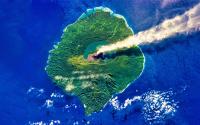21 August 2007Environmental News NetworkAlister Doyle
Polar bears and seals have also suffered this year on the Norwegian archipelago of Svalbard because the sea ice they rely on for hunts melted far earlier than normal.
"Reductions of snow and ice are happening at an alarming rate," Norwegian Environment Minister Helen Bjoernoy said at a seminar of 40 scientists and politicians that began late on Monday in Ny Alesund, 1,200 km (750 miles) from the North Pole.
"This acceleration may be faster than predicted" by the U.N. climate panel this year, she told reporters at the Aug. 20-22 seminar. Ny Alesund calls itself the world's most northerly permanent settlement, and is a base for Arctic research.
The U.N. panel of 2,500 scientists said in February that summer sea ice could almost vanish in the Arctic towards the end of this century. It said warming in the past 50 years was "very likely" the result of greenhouse gases caused by fossil fuel use.
"There may well be an ice-free Arctic by the middle of the century," Christopher Rapley, director of the British Antarctic Survey, told the seminar, accusing the U.N.'s Intergovernmental Panel on Climate Change (IPCC) of underestimating the melt.
The thaw of glaciers that stretch out to sea around Svalbard has revealed several islands that are not on any maps.
"Islands are appearing just over the fjord here" as glaciers recede, said Kim Holmen, research Director at the Norwegian Polar Institute, gesturing out across the bay. "We're already seeing adverse effects on polar bears and other species."
UNCLAIMED
"I know of two islands that appeared in the north of Svalbard this summer. They haven't been claimed yet," said Rune Bergstrom, environmental expert with the Norwegian governor's office on Svalbard.
He said he had seen one of the islands, roughly the size of a basketball court. Islands have also appeared in recent years off Greenland and Canada.
Rapley also said the IPCC was "restrained to the point of being seriously misleading" in toning down what he said were risks of a melt of parts of Antarctica, by far the biggest store of ice on the planet that could raise world sea levels.
Still, in a contrast to the warnings about retreating ice and climate change, snow was falling in Ny Alesund on Monday, several weeks earlier than normal in a region still bathed by the midnight sun. About 30 to 130 people live in the fjord-side settlement, backed by snow-covered mountains.
Bjoernoy said it was a freak storm that did not detract from an overall warming trend.
The U.S. National Snow and Ice Data Center said on Friday that Arctic sea ice had "fallen below the 2005 record low absolute minimum and is still melting". Arctic sea ice reaches an annual minimum in September before freezing again.
The U.S. records are based on satellite data back to the 1970s.
Rapley said that shrinking ice was bad for indigenous peoples and for much wildlife but could help anyone wanting to hunt for oil and gas or open short-cut shipping lanes between the Atlantic and Pacific Oceans.
Norway hopes the seminar, with delegates from countries including top greenhouse gas emitters the United States and China, may put pressure on governments to agree to make deeper cuts in greenhouse gas emissions, Bjoernoy said.






